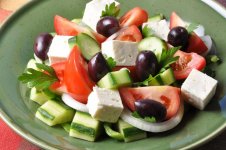mastichas09
Active member
I didn't know that the tomato isn't native to Greece until my last trip to the country. One of the farmers I met mentioned it. So, I was curious as to how the tomato started getting used in Greek cooking. Here's a summary of some of the information I found:
Tomatoes are thought to have come from South America. They were introduced to Europe by Spanish explorers in the 16th century and eventually made its way to Greece. However, it wasn’t an immediate hit with the locals. Many Greeks were skeptical of the tomato, believing it to be poisonous due to its bright red color. It wasn’t until the mid-19th century that the tomato started gaining popularity in Greece, thanks in part to Italian immigrants who brought with them a love for tomatoes.
How are tomatoes used in Greek cuisine? My favorite is the horiatiki (village) salad. It features tomatoes, cucumbers, onions, feta cheese, and olive oil, with optional additions like olives and peppers. It’s the perfect salad for a hot summer day. Another popular tomato-based dish is moussaka, a baked dish made with layers of eggplant, potatoes, ground meat, and, of course, tomato sauce. This hearty meal is a staple in Greek households, often served on special occasions or weekends.
What makes the tomato such an important ingredient in Greek cuisine is its versatility. Tomatoes can be used in a wide range of dishes, from soups and stews to casseroles and sauces. They can be baked, grilled, roasted, or eaten raw. And they pair beautifully with a variety of other ingredients, from classic Mediterranean flavors like feta cheese and olives to more unexpected combinations like cinnamon and even cumin, which has been used more and more in Greek cuisine over the past few years.

Tomatoes are thought to have come from South America. They were introduced to Europe by Spanish explorers in the 16th century and eventually made its way to Greece. However, it wasn’t an immediate hit with the locals. Many Greeks were skeptical of the tomato, believing it to be poisonous due to its bright red color. It wasn’t until the mid-19th century that the tomato started gaining popularity in Greece, thanks in part to Italian immigrants who brought with them a love for tomatoes.
How are tomatoes used in Greek cuisine? My favorite is the horiatiki (village) salad. It features tomatoes, cucumbers, onions, feta cheese, and olive oil, with optional additions like olives and peppers. It’s the perfect salad for a hot summer day. Another popular tomato-based dish is moussaka, a baked dish made with layers of eggplant, potatoes, ground meat, and, of course, tomato sauce. This hearty meal is a staple in Greek households, often served on special occasions or weekends.
What makes the tomato such an important ingredient in Greek cuisine is its versatility. Tomatoes can be used in a wide range of dishes, from soups and stews to casseroles and sauces. They can be baked, grilled, roasted, or eaten raw. And they pair beautifully with a variety of other ingredients, from classic Mediterranean flavors like feta cheese and olives to more unexpected combinations like cinnamon and even cumin, which has been used more and more in Greek cuisine over the past few years.

Last edited:


